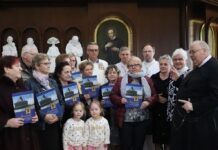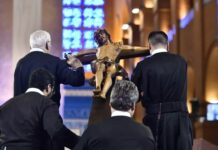“To preach the gospel ever anew” – In dialogue with our time
Introduction
One of the most well-known expressions of St. Clement Maria Hofbauer includes the words: “The gospel has to be preached ever anew.” There is always special attention in the whole Redemptorist family to these words. Emanuel Veith, one of his followers in Vienna and himself an important preacher, reports that Clement came back to this phrase again and again and pronounced it “solemnly and emphatically” (Monumenta Hofbaueriana XII, 245-246). Obviously, this was a very special concern for Clement.
For us Redemptorists, it is actually a particularly valuable sentence. It points to the essence of our mandate to preach the Gospel to the poor (Constitution 1). At the same time, it gives us the task of doing this with special attention to the questions and hopes of the people of our time. For the Gospel to meet open ears and hearts, proclaimers are needed who are close to the people, who know them and who understand their situations in life. As Redemptorists, it is our mission to be close to the people in this specific way and to be in an alert dialogue with our times.
Saint Clement – in dialogue with his time?
When we speak of a “dialogue with his time” in connection with Saint Clement, it actually sounds too good to be true. We know that Clement (like all the confreres and co-workers he gathered around himself) was like a toy in the hands of the powerful of his time. What he had built up in Warsaw over the years was immediately destroyed by a decision by Napoleon. His attempts to found a community in southern Germany and Switzerland were made impossible by the governments there. There were severe setbacks that Clement had to experience, and it was only shortly after his death that Emperor Franz II permitted the first establishment of an official Redemptorist community. Clement was often a victim of the powerful of his time. It was not a dialogue; it was a struggle (in which Clement was mostly defeated).
That was the view of politics in the life of Saint Clement. Another perspective was his pastoral work. Despite the adverse political circumstances, his pastoral work was extremely varied and fruitful. This is especially true for the “ongoing mission” in Warsaw with the many, also festive services, the sermons and catechesis, and the social commitment for the orphans and pupils (whereby Clement also campaigned for the education of girls). This also applies to his work as a pastor in the various groups in Vienna, in which people of very different origins and different classes were found. Clement was obviously close to the people of his time. He knew how to listen to their questions and how to give direction to what they were looking for. He knew how to introduce them to Jesus Christ so that they could go forward in the Christian faith.
In our time
We live today in a different time than Saint Clement, 200 years later. There are other arguments and questions we are facing. It is not so much the governments that make life difficult for us, Redemptorists – although there are some in our world. Rather, we are often faced with the challenge that people of our time are influenced by the tendencies towards secularization and live distant from the faith. We are faced with questions other than did Clement in his time. But we can be inspired by him to seek and continue the dialogue with the people of our time.
For such a dialogue to be successful and fruitful, important first is the willingness to listen. This applies to our very specific pastoral experience in meeting and listening to people; it also applies to when we work on the planning and priorities of our ministry and prepare decisions. We open a space to listen to the other person. We are ready to let them tell us about his/her life and situation. The starting point is not our view of things; the starting point is the experience and questions of the other. In a special way, it is about us perceiving a person’s needs and worries as well as getting to know his/her hopes and winning their confidence.
I was very impressed when a confrere from the Philippines told me about their work. When one of the severe natural disasters hit a region of the country, they set out to help the people there. They brought food and clean water, blankets, and lots of practical things for everyday life. But they also listened to the people who wanted to tell their stories: stories of hardship, fear, worry, and their pain. And slowly, little by little new stories of hope began to be told again.
As part of the work on the Apostolic Plan of the Conference of Europe, there have been many gatherings of confreres and Redemptorist partners across Europe during the past two years, as well as many individual discussions. Again and again, we talked about what priorities we see for Redemptorists and it is remarkable how often the ministry of listening and its importance was mentioned.
For a dialogue to be fruitful and to generate an impulse for future life, another element is required: dialogue needs the ability to discern. The experiences of life alone, our needs and our hopes do not necessarily lead us further. Regarding the life of the Redemptorists, Constitutions 23 and 24 speak of this ability of discernment:
“Since the members are called to continue the presence of Christ and his mission of redemption in the world, they choose the person of Christ as the center of their life… So as to share truly in the love of the Son for his Father and for people, they will cultivate the spirit of contemplation which deepens and strengthens their faith. This will enable them to see God in the people and in the events of everyday life. They will see his plan of salvation in its true light and be able to distinguish between what is real and what is illusory.”
Only when the clear view of the reality of one’s life (and our time), God’s plan of salvation, and His promise to our world come together, can we get the full picture. It so happens that a third partner enters into the conversation: “Thus, at the heart of the community, to form it and sustain it, is the Redeemer himself and his Spirit of love.” (Constitution 23). Only when this happens can a dynamic emerge that leads us further and makes us grow.
I have already mentioned above that this dynamic had developed a special power in the life of Saint Clement. There is only one thing to add: Clement developed a dynamic that not only affected his own life, but also the lives of his confreres and the people who came into contact with him. They received the impulse, that in a different way, compelled them to continue. This is also the result of a fruitful dialogue: many different people help to keep it going.
Questions for dialogue:
- What experiences do I have/do we have in our community with the “ministry of listening”? What do we understand from the people we meet?
- What do I experience/do we experience in our community as special challenges for our faith and our ministry today?
- What word of the Gospel do I hear/do we hear today as a challenge or as an encouragement for our life and our faith?
PRAYER
Father of mercy, in the life of St. Clement you have revealed to us
the original freshness of the Gospel.
Pour out your Spirit so that we can serve with creative fidelity
the mission of the Church and the Congregation.
Make us ready to listen to people
and enable us to answer their questions and needs,
to understand their hope and longing.
Give us open eyes and open hearts so that we can learn
to discover you in the people and in the events of everyday life.
Teach us to grow and to trust your promises you gave us.
And when we reach the limits of what we can achieve,
give us confidence and trust in your presence,
that carries far beyond everything we can reach.
Rekindle in us the missionary dynamism
so that your Church may rejoice with the joyful announcement of
the fullness of the Redemption of your Son Jesus Christ.
We ask this through Jesus Christ, your Son …
Amen
This text was written in German by Johannes Römelt, CSsR
Translation: Manny Rodriguez CSsR.
ONE BODY is a monthly prayer text proposed by the Center for Redemptorist Spirituality.
For more information: Fr. Piotr Chyla CSsR (Director of the Center for Spirituality – fr.chyla@gmail.com).
Download pdf: 02 EN In dialogue with our time





